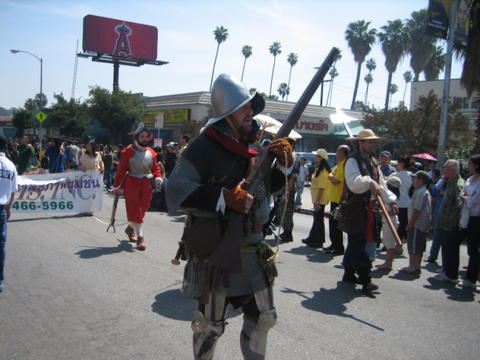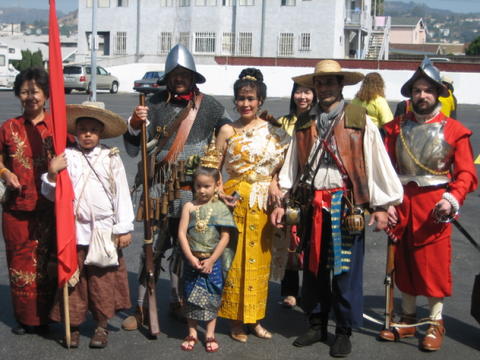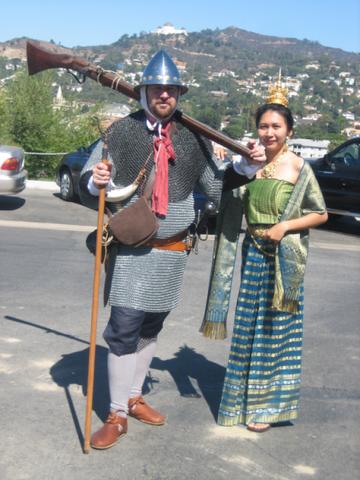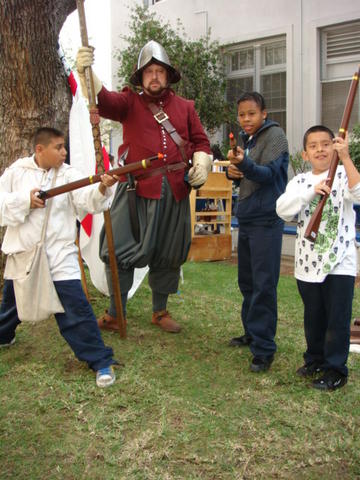Posts: 62 Location: PORTUGAL
Thu 20 Nov, 2008 10:11 am
Spanish/Portuguese sword rapier for coments
This one will be home for Christmas.
Blade 98 cms (38 1/2"), with 20 mm (3/4") width.Total length 114 cms (45"), which makes it almost two inches "off mark" :eek: , as the period allowance was five palms (110 cms=43").
The huge cup bowl is 16 cms (6.3") wide, which is the largest cup this seller ever sold.
Attributed date by the seller around 1700.
Slightly faded inscription on the blade reads in one side VIVA EL REY and on the other DE PORTVGAL.
Fernando
.







Posts: 4,194 Location: Northern VA,USA
Thu 20 Nov, 2008 10:15 am
Beautiful, Fernando! I am a big fan of that type of grip.
I've always found it interesting that the Spanish continued to use this style of sword well into the 18th century. Thanks for sharing this!
Posts: 62 Location: PORTUGAL
Thu 20 Nov, 2008 10:35 am
Thank you Bill.
In fact, cup hilted sword "survivors" were still a resource for the population in the first half of the 19th century ... at least in the various Portuguese civil wars.
Fernando
Posts: 1,265 Location: Malaysia
Sun 23 Nov, 2008 5:34 pm
Spanish/ Portuguese rapier for comments
Fernando, your sword's tip looks blunt. Will you consider sharpening it?
Posts: 62 Location: PORTUGAL
Tue 25 Nov, 2008 5:46 am
Re: Spanish/ Portuguese rapier for comments
Hi Shahril,
| Shahril Dzulkifli wrote: |
| Fernando, your sword's tip looks blunt. Will you consider sharpening it? |
Absolutely not !
I wiil keep it as it is; most probably it is like that since its origin. In any case i won't touch it.
Fernando
Posts: 279 Location: Central NJ
Tue 25 Nov, 2008 12:15 pm
That's a nice-looking cup-hilt rapier.
What's also interesting is that cup-hilted swords were sometimes fitted with broadsword blades--eg., the bilbo (the guard is actually two shells, but it seems similar enough to the cup-hilt), and the "Caribbean cup-hilt" broadsword (considered by at least some curators to merely be a bilbo variant) that was evidently so popular with pirates. I've handled a couple of original "Caribbean cup-hilts", and the most striking thing I have found about them is that, despite the substantial blade and truly vestigal pommel, they have all been light and well-balanced. Such swords were even issued to Pampangan soldiers in the Spanish service in the Philippines, so they apparently figure into the history of eskrima too.
Posts: 31
Wed 26 Nov, 2008 12:51 pm
Great rapier
Bom Dia Fernando,
For some reason, I can email you so I am posting a link to my 17th Century Portuguese Mer unit here in California.
Make sure you see the photos. I think you will appreciate them.
http://groups.yahoo.com/group/companhiasantaisabel/
Bruce
 Attachment: 32.97 KB
Attachment: 32.97 KB

Restoring sanity, morality, and order to Hollywood Blvd.
Posts: 62 Location: PORTUGAL
Wed 26 Nov, 2008 1:54 pm
Hi Rodrigo, boa noite,
That's nice :) .
Are these reenactors Portuguese folks? Azorean or Continental?
Do you belong in this group?
Where are they based?
Meus cumprimentos
Fernando
Posts: 62 Location: PORTUGAL
Wed 26 Nov, 2008 1:56 pm
| David Black Mastro wrote: |
| That's a nice-looking cup-hilt rapier... |
Thank you David :)
Posts: 31
Wed 26 Nov, 2008 2:01 pm
Fernando,
We are in California. The man in red is a Spanish pig. He is an inquisitor to ensure our loyalty. We portray mercanarios in Asia. When I was living in Thailand, I did alot of research on the large Portuguese private armies of the Siamese rulers. Siam was never colonized, but up to 40,000 Portuguese mercs served there in various armies from 1520-circa 1640.
This event is our annual Thai New Year Parade. We actually serve as bodyguards for a 6 year old Siamese princess, who is actually portrayed by a Salvadorean. That's USA for you. She's half Mayan so she passes.
Bom Dia Amigo.
Bruce
aka Rodrigo
 Attachment: 42.43 KB
Attachment: 42.43 KB

 Attachment: 33.93 KB
Attachment: 33.93 KB

Posts: 62 Location: PORTUGAL
Wed 26 Nov, 2008 2:23 pm
Magnificent Bruce; outstanding :) ;) .
I am not a cultured guy, but i have already been through this Mercenary situation in Siam and around. I guess i have to go back to that material once more.
Sorry for my confusion, what is your nationality ... i mean your origins ? :confused:
... That is, if you don't mind to tell ;)
Fernando
Posts: 1,265 Location: Malaysia
Sat 29 Nov, 2008 5:36 pm
Spanish/ Portuguese rapier for comments
It's weird to see a Salvadorean girl portraying a Siamese princess.
To me, the boy with the flag and 2 other princesses (or queens, who knows?) are Thai-Americans.
Posts: 31
Sun 30 Nov, 2008 3:29 am
Fernando,
100% American. However, my grandparents were all Jews from Ukraine, Baltics, Galicia, and Germany.
Shahil,
This is America. We have Chinese doing WW2 German. I take it your Georgian. In my WW2 group, we have a Georgian Legion (German) that is commanded by a guy who is half Japanese and his wife who runs the German Red Cross medics is Mexican-American of Celtic Spanish ancestry.
In my 16th Century Scottish clan, our fiddler is black and one of our top champions is Native American but they all proudly portray Celts. God Bless America, only in America.
As far as the princesses go. We know have three; one is Mexican-American, one is Salvadorean, and our newest 10 year old is half Japanese, half German. Next year our son (who is half-Thai) will join. The flag carrier is Mexican.
Confused, yet?
Posts: 31
Sun 30 Nov, 2008 10:29 am
Oh yes, and I have a re-enactor friend. He is Japanese-America. He is a Union Army colonel, commander of our Imperial Japanese WW2 unit, and a real-life officer and veteran in the US Army Reserve.
Bruce
Posts: 279 Location: Central NJ
Sun 30 Nov, 2008 11:57 am
Portuguese mercs also fought for the Chinese at that time, and they were also part of the manpower of the wako.
Posts: 31
Sun 30 Nov, 2008 12:05 pm
David
Right you are. These mercs were all over Asia; India, China, Japan, East Indies, Burma, Siam, and even had a large presence in the various armies of East Africa.
Here's are great books on this subject;
http://www.amazon.com/Pirate-Far-East-811-163...amp;sr=8-1
ttp://www.amazon.com/Imperial-Chinese-Armies-1520-1840-Men-at-Arms/dp/1855326558/ref=sr_1_3?ie=UTF8&s=books&qid=1228075286&sr=1-3
Apparently, there were many black mercs in these contingents too. I don't know if they were slaves are freedmen. Many Portuguese also merc'd themselves out to the Spanish in Nueva Espana post conquest. There were a number Portuguese noblemen on Coronado's expedition.
Here are some pics of our new armies being trained
 Attachment: 40.94 KB
Attachment: 40.94 KB

Posts: 279 Location: Central NJ
Sun 30 Nov, 2008 12:43 pm
Yep, I have both of those titles.
Despite chronic shortages of manpower, the Portuguese were able to establish themselves strongly in Asia, because of superior naval technology. While many folks seem to associate the development of standoff gunnery on sailing ships with the Elizabethan English, the Portuguese were, in fact, the pioneers of this, c. 1500. They mounted powerful, stone-throwing camelos on their caravels, and used these to great effect against all enemies. I recommend Galleons and Galleys by John F. Guilmartin, for more info.
| Quote: |
| Apparently, there were many black mercs in these contingents too. I don't know if they were slaves are freedmen. |
From what I understand, they were slaves.
| Quote: |
| Many Portuguese also merc'd themselves out to the Spanish in Nueva Espana post conquest. There were a number Portuguese noblemen on Coronado's expedition. |
And de Soto's, too.
Apparently, the Portuguese soldiers in de Soto's expeditions were well armed and equipped, whereas the Castilians made do "with very bad lances", according to Harold L. Peterson, who quoted the Gentleman of Elvas. Check Peterson's excellent Arms and Armor in Colonial America 1526-1783, which should still be available as a Dover reprint. It's a very useful book, and Peterson was a great writer/researcher--something like America's version of Ewart Oakeshott.
Best,
David
Posts: 62 Location: PORTUGAL
Tue 02 Dec, 2008 2:44 pm
| Bruce Willis wrote: |
... However, my grandparents were all Jews from Ukraine, Baltics, Galicia, and Germany.
|
Interesting ancestry; Sephardits and Aschkenasi.
Sometimes, when comunicating with people of various origins, i feel myself abnormal :eek:
I am Portuguese, son, grandson and great grandson of Portuguese, and reside in Portugal; actually in the same place where i was born ... well, after being around for a while ;) .
Quite monotonous, right ?
Fernando
Posts: 62 Location: PORTUGAL
Tue 02 Dec, 2008 3:11 pm
| David Black Mastro wrote: |
| ... Despite chronic shortages of manpower, the Portuguese were able to establish themselves strongly in Asia, because of superior naval technology. While many folks seem to associate the development of standoff gunnery on sailing ships with the Elizabethan English, the Portuguese were, in fact, the pioneers of this, c. 1500. They mounted powerful, stone-throwing camelos on their caravels, and used these to great effect against all enemies ... |
So true, David.
Indeed you are well documented in the subject.
I have a very interesting article about this situation. It is a PDF document. In case you or other members are interested, just send me a PM with your email address.
Fernando
Posts: 31
Tue 02 Dec, 2008 4:39 pm
David
I think we've been reading the same books.
Fernando, please send me your info on PDF.
Fernanod, you are Portuguese. That means you are Romano-Celt with probably some Berber and Sephardic blood. Be proud, my friend. You come from a very ancient and proud land.
Here are my favorite Portuguese Merc Pics
You
cannot post new topics in this forum
You
cannot reply to topics in this forum
You
cannot edit your posts in this forum
You
cannot delete your posts in this forum
You
cannot vote in polls in this forum
You
cannot attach files in this forum
You
can download files in this forum










